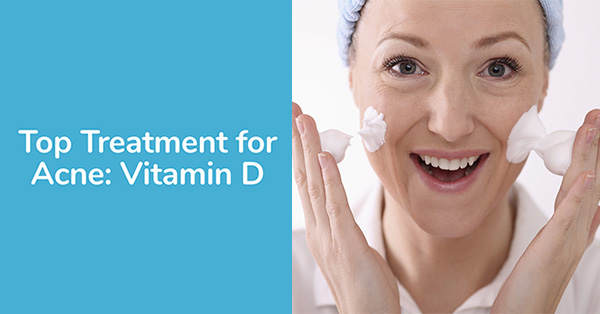Contents
Everybody knows that Vitamin D is an important fiber that can simply be obtained through sunbathing. Vitamin D has been in clinical trials to see if it can be used as an Acne (clinically known as acne vulgaris) treatment. Vitamin D is a fat-soluble vitamin that can build up in your system.
This powerful mineral can have incredible effects on many systems throughout your body with many people assuming that it can cure every disease or illness under the sun.
Many experts will recommend using Vitamin D to combat a huge variety of diseases with Vitamin D deficiency being named as a huge contributor to multiple illnesses.
It has now been estimated that about 1 billion people worldwide have Vitamin D deficiency.
Is Vitamin D important?
Vitamin D is incredibly important for your body, with every single cell in your body having a receptor for it so it is beneficial when battling certain health conditions. Serum vitamin D has been liked to severe acne vulgaris in patients who deal with a lot of stress and acne sufferers often have low serum vitamin or relatively low serum vitamin D.
One of the main benefits the nutriment has is helping treat acne (acne vulgaris) however, some foods like milk and cheese that contain vitamin D have been found to make acne symptoms worse.
However, while many experts are encouraging people to increase their nutriments levels, it can never fully cure a disease all by itself.
Furthermore, a high level of Nutriments can in fact be toxic so it is important to not overdo anything.
Are Vitamin D and Vitamin E the same?
Vitamin D and E have both the same nutrients but are different, Vitamin D is more to do with your bones and skin while Vitamin E has more to do with your central Nervous system and a deficiency in it often results in disorientation and visual problems.
What is Vitamin D deficiency?
Vitamin D deficiency means you do not have enough of the nutrient in your body and it is one of the many vitamins your body needs to stay healthy. Your skin actively produces it by using sunlight and it has many functions such as keeping your bones strong, keeping your skin strong and rejuvenating skin. Vitamin D also contributes to skin cell growth and skin repair. So it is important to keep your vitamin d levels up. People with vitamin D deficiencies are more susceptible to acne.
You may notice some symptoms of Vitamin D deficiency in your skin like dry skin, skin rashes, acne, or signs of aging. It is important to note however acne is also a common skin problem. It can also cause nodulocystic acne, a nodulocystic acne is a severe form of acne that affects the face, chest, and back, nodulocystic acne is notorious for causing scarring across your body.
Vitamin D deficiencies are more frequent in people with acne than in healthy controls. If you are worried about your acne use the global acne grading system or talk to your doctor. It has also been noted a deficiency of the mineral has been implicated in various skin diseases.
So are Vitamin d levels important?

Yes as they affect your skin health, Sitting in the sun will increase your Vitamin D levels d. However, keep in mind prolonged sun exposure will increase your risk of sunburn and skin cancer. If you are worried your Vitamin D levels aren’t high enough that you talk to a doctor or a dermatologist about having your blood tested as you might have vitamin d insufficiency.
Vitamin D levels can also affect your skin health. There is a link between vitamin D levels and acne and the mineral can help prevent acne and keep acne severity low. So if you live where the sun doesn’t shine, you probably have low vitamin D levels.
For example, a 2016 study Trusted Source of 80 acne patients found that 49% of those with acne had low vitamin D levels compared to 23% of patients without acne. After which the 80 acne patients had their vitamin D levels increased and suffered less from their acne severity.
Many people are unaware that there are actually 3 different types of Vitamin D. Vitamin D1 is found in products such as mushrooms, earthworms, and algae.
It’s made up of the chemicals lumisterol and ergocalciferol. They can then refine vitamin D1 into pure ergocalciferol, which is also known as vitamin D2.
Humans can also use vitamin D2, which makes another chemical called cholecalciferol, also known as vitamin D3.
Vitamin D3 is already made in the body as your skin will produce it when it’s exposed to the sun. Ultraviolet rays which come from the sun can catalyze the formation of Vitamin D3 which is made from the compound 7-dehydrocholesterol found in the skin.
If one has cholesterol in their system then they will automatically produce more Vitamin D3.
However, if one is lacking in cholesterol then their system will not be able to produce as much Vitamin D3 as they need.
Overall, if a person spends a large deal of time outside without much sun cream on then they could be receiving all the Vitamin D they need. The mineral helps to boost the immune system.
Vitamin D plays a key role in the absorption of calcium, which is vital when it comes to bone health. This mineral can also benefit many different systems and impact how well they function.
These systems within the human body include the immune system, muscle system, or nervous system. Most of the Vitamin D that benefits these systems is formed when the nutrient is activated in your skin during sunlight.
However, smaller amounts of Vitamin D can be found in other foods such as fatty fish, eggs and are also fortified in milk.
Many experts have research to back up the fact that that women with low levels of this mineral have a higher risk of breast cancer.
Vitamin D could contribute to normal breast cell growth which will therefore potentially be able to stop breast cancer cells from forming.
Does Vitamin D Have an Impact on Skin Infections?
Vitamin D produces macrophages, which are a type of white blood cell. They are so big that occasionally they have lots of nuclei and have many replicas of their individual DNA which are required to code the proteins that keep the cell functioning.
Vitamin D deficiency is also linked with acne due to studies that have confirmed there is a link between vitamin d deficiency with acne. Vitamin D deficiency can lead to dry skin.
These white blood cells are in our blood vessels, our cholesterol, and many other areas. When they encounter excess cholesterol or any other form of issue in the body, they engulf it and develop it into the nutrients which are actually required in the body.
Vitamin D is unique compared to other vitamins as it isn’t actually a normal type of vitamin, but is instead a hormone with the name of calcitriol. This hormone can be created when there is a steady stream of sunlight on a person’s skin. However, the researchers state that topical products could help with acne if they increase vitamin D levels and reduce inflammation.
How Does it Help Acne Vulgaris Patients?
When one is struggling with acne, it’s important to know that since Vitamin D is practically just a hormone, it will also have an impact on other hormones as well. Acne vulgaris patients over time suffer from acne less and less.
Because all these hormones links to each other, when one hormone is lower than it should be it can also create an imbalance within other hormones. The imbalance in these hormones can then create health problems such as acne.
If the acne you have is caused by bacterial overgrowth, using topical vitamin D might calm your symptoms. Topical vitamin d does have a cream product, however, needs more studies to show if a topical vitamin D cream or an ingestible vitamin d supplement would work better to ease and treat acne (acne vulgaris) and severe acne.
Vitamin D is key when it comes to creating a healthy body so when your levels are high it can heal any cuts, spots, or scars on the skin and prevent infection.
Many myths state that the sun could help in drying skin and therefore helping to remove acne (acne vulgaris). However, experts now know that this is in fact very negative for our skin and will make acne much worse.
It’s important to get sunlight to keep levels of Vitamin D but to avoid excess levels of sunlight as this can do more harm than good.
What Can I Do to Get More Vitamin D?
If you want to get more Vitamin D into your diet make sure to check our shortlist below, remember though too much of the mineral can actually be and for you.
If you need advice on it make sure to talk to a doctor or a dermatologist as it is important to make sure you don’t get vitamin d deficiency and to keep your vitamin d levels at a safe level.
So if you are told you have a Vitamin D deficiency, which is common, what happens next? You go to the store, get some supplements, and start taking them with no stop date or guidance on dosage. Vitamin D supplementation can become dangerous if you have too much vitamin D. It is important to treat vitamin D supplementation responsibly.
At least 1000 IU per day and up to 5000 IU per day of vitamin D3 would be amazing for your immune system. You could potentially have taken in too much Vitamin D which could lead to your skin becoming overly sensitive to the sun. This will happen in the case that someone is having 50,000 IU per day for longer than a month.
Spend More Time in Sunlight.
Vitamin D is often called the “Sunshine Vitamin” Because the sun is one of the best sources for it. It is important to note however that too much sun can be bad for you again as it can cause skin cancer and skin burns.
If you do want to get sunlight and will be following the rules above, then make sure to not wear excessive sun cream.
The more periods of time that you get in the sun and the less sun cream that you wear, the less time that you will need to spend in the sunlight.

If you are simply getting sunshine in small amounts or on small areas of your body, then you will need a spend time in the sun daily.
However, if you are hugely exposed to no sun cream then you won’t have to seek sunlight as much.
Add more Fatty Fish and Seafood to your diet.
Fatty fish and seafood have a rich abundance of vitamin D and are one of the richest natural sources next to the sun.

Salmon, Tuna, Mackerel, Oysters, Shrimp, Sardines, Anchovies, and Herring to name a few have quite a rich amount of the mineral so make sure to bring them into your diet.
It is important to remember that you can keep your Vitamin D levels high from foods such as cod liver oil but make sure to not take more than 15ml within a 24 hour period.
Use some Vitamin D supplements
Vitamin D supplements are often used to get vitamin D, In 2016 a study found that vitamin D supplements resulted in clearer skin after 8 weeks, keeping your vitamin d levels at a good level also helps with acne (acne vulgaris) inflammation and helps people who are deficient in this mineral.

If you are not able to get Vitamin D in regular doses then you must take Vitamin D supplements. vitamin D supplementation is important to make sure you have enough Vitamin D.
People who have suffered from acne have experienced significantly improved symptoms when they have taken an oral vitamin D supplement and a decrease in acne inflammation.
Eat Some Greens and Mushrooms
Spinach and mushrooms both have Vitamin D in them.

Wild Mushrooms being the best source for the mineral rather than commercial, You can also purchase mushrooms treated with UV light
However, you should always take care to identify wild mushrooms or purchase them from a trusted supplier to avoid eating any poisonous mushrooms.
More Food Types
Eggs are another great source of Vitamin D and are very simple to add to your diet as you can add them to most foods. It is important to note chicken feed can affect the mineral in the yolk so free-range eggs are a great source of the mineral.

Make sure to avoid foods like milk and cheese in large quantities though as it can affect acne symptoms. Make sure to check the food and nutrition board for more information.
For more tips on acne treatment and supplements, consult a dermatologist or pharmacist for more information on how to treat acne (acne vulgaris) and severe acne.



